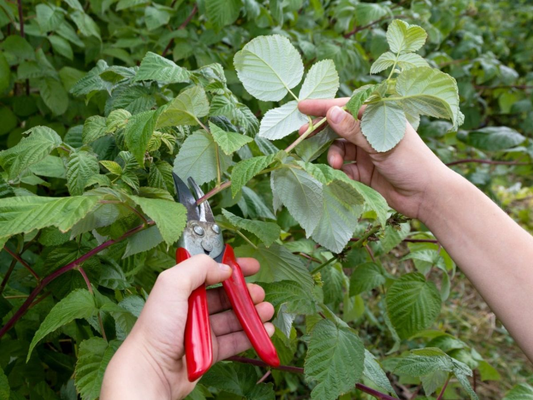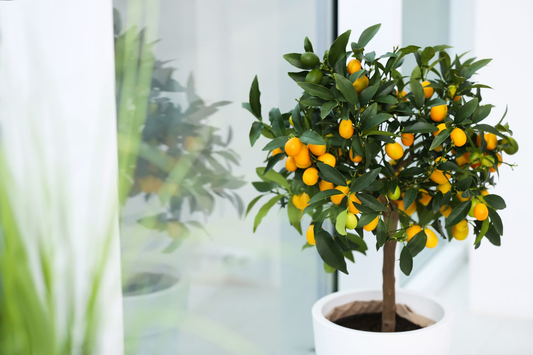12 Incredible Benefits of Indoor Plants for Your Mental Health
Share
Table of Contents
1. Introduction: The Connection Between Nature and Mental Health
In today's fast-paced and increasingly urbanized world, more people are turning to nature as a source of solace and calm. While not everyone has access to outdoor green spaces, indoor plants have emerged as a simple yet effective way to bring the calming essence of nature into homes and offices. The growing popularity of indoor plants is not just a trend but a reflection of our need to reconnect with nature, even in confined spaces.
Recent studies have highlighted the deep connection between nature and mental health, showing that exposure to natural elements has a positive impact on our psychological well-being. Whether it’s the soothing green hues, the gentle act of nurturing a plant, or the cleaner air they provide, plants play a significant role in mental restoration. This connection is particularly important in today’s society, where stress, anxiety, and mental fatigue are widespread.
Indoor plants can serve as a natural antidote to these modern challenges, offering a multitude of mental health benefits. The simple act of placing a plant on a desk or in a living room corner can have profound effects on mood, stress levels, and overall well-being. As we dive into the various ways indoor plants can improve mental health, you'll discover how these natural companions can be both aesthetically pleasing and emotionally healing.
Key Highlights of the Connection Between Nature and Mental Health
- 1. Reconnecting with Nature Indoors: Bringing plants inside helps simulate the calming effects of being outdoors.
- 2. Psychological Benefits: Studies show that exposure to natural elements can reduce stress, anxiety, and mental fatigue.
- 3. Visual Calm: The visual appeal of plants provides a break from the artificial, fast-paced environments of urban life.
- 4. Mental Restoration: Indoor plants contribute to restoring mental clarity and focus.
This article will explore the 12 incredible benefits of indoor plants, particularly focusing on how they can improve mental health. From reducing stress to enhancing mood and even boosting creativity, the mental well-being benefits are vast. Let’s dive into these benefits in detail and learn how incorporating plants into your indoor space can lead to a healthier mind.

2. Benefit #1: Reduced Stress and Anxiety
One of the most significant mental health benefits of indoor plants is their ability to reduce stress and anxiety. Numerous studies have shown that simply being around plants can lower stress levels, creating a more relaxed and calm environment. Whether placed in a home, office, or any indoor space, plants have a soothing presence that can ease tension and promote a sense of peace.
How Indoor Plants Help Reduce Stress
- 1. Lower Cortisol Levels: Research has found that exposure to plants can help lower cortisol, the hormone associated with stress. Reduced cortisol levels lead to a decrease in anxiety and overall tension.
- 2. Natural Soothing Effect: The calming, green appearance of plants can have a therapeutic effect on our minds, helping us feel more relaxed and grounded.
- 3. A Quiet Escape: Indoor plants offer a visual and sensory break from the hustle and bustle of daily life, providing a sense of tranquility.
Scientific Evidence Supporting the Stress-Reducing Effects of Plants
- 1. Study on Office Workers: A study conducted by the University of Technology in Sydney found that employees who worked in environments with plants reported lower levels of stress and anxiety compared to those without greenery.
- 2. The “Biophilia Hypothesis”: This theory suggests that humans are naturally drawn to nature, and indoor plants tap into this innate connection, helping reduce feelings of stress.
By incorporating indoor plants into your living or working space, you can create a calming atmosphere that promotes mental relaxation and reduces stress. Whether it's the physical act of caring for a plant or simply enjoying its presence, the psychological benefits are undeniable.
3. Benefit #2: Enhanced Mood and Happiness
Indoor plants not only beautify your space but also play a significant role in enhancing mood and promoting happiness. Research has shown that interacting with nature, even in small doses, can naturally uplift your spirits and contribute to emotional well-being. The presence of plants helps reduce negative emotions, replacing them with a sense of calm and positivity.
How Plants Uplift Mood and Promote Positive Feelings
- 1. Connection with Nature: Plants provide a direct connection to nature, which can have a calming and mood-enhancing effect, especially for people living in urban environments where greenery is scarce.
- 2. Improved Emotional State: The act of caring for a plant, such as watering or repotting, encourages a nurturing mindset and fosters a sense of purpose, which can lead to a better emotional state.
- 3. Natural Anti-Depressant: Studies have shown that exposure to plants and greenery can help alleviate symptoms of depression and anxiety, contributing to a more positive outlook.
Examples of Emotional Satisfaction from Indoor Gardening
- 1. Sense of Accomplishment: Watching a plant grow and thrive under your care provides a sense of achievement, boosting feelings of satisfaction and happiness.
- 2. Creative Expression: Indoor gardening allows individuals to express their creativity, whether through plant arrangements or designing indoor green spaces, which in turn enhances mood and emotional well-being.
- 3. Reduced Loneliness: Caring for plants can reduce feelings of loneliness, as many people find comfort and joy in tending to their greenery, creating a bond that promotes happiness.
By introducing indoor plants into your home, you can experience a noticeable improvement in your mood and overall happiness. The calming presence of greenery, combined with the emotional satisfaction of caring for a living thing, makes indoor plants a powerful tool for mental well-being.

4. Benefit #3: Boosted Concentration and Focus
Indoor plants do more than just beautify spaces—they can significantly boost concentration and focus. This is particularly beneficial in work environments, where staying mentally sharp and focused is crucial. The presence of greenery in workspaces has been shown to improve cognitive function, making it easier to concentrate and process information.
How Indoor Plants Improve Cognitive Function and Focus
- 1. Reduced Mental Fatigue: Indoor plants help alleviate mental fatigue by providing a natural, calming visual break that refreshes the mind.
- 2. Enhanced Attention Span: Studies suggest that having plants nearby can enhance attention span, allowing individuals to focus on tasks for longer periods.
- 3. Restorative Effect: The restorative properties of plants can reset the brain’s attention capacity, improving mental clarity and focus after exposure to nature.
Studies Supporting the Role of Plants in Workspaces
- 1. University of Exeter Study: Research from the University of Exeter found that employees who worked in offices with plants were 15% more productive compared to those in plant-free environments. This increase in productivity was linked to improved concentration and focus.
- 2. Attention Restoration Theory: The theory posits that exposure to nature, including indoor plants, helps restore the brain’s ability to concentrate on demanding tasks, making plants an excellent addition to workspaces and study areas.
By placing indoor plants in your home or office, you can enjoy a boost in concentration and focus, leading to greater productivity. Whether you're working from home or managing a busy office, plants offer a simple yet effective way to enhance cognitive performance.
5. Benefit #4: Improved Sleep Quality
Indoor plants can also play a vital role in enhancing sleep quality, especially in bedrooms where creating a calm and relaxing environment is key. Certain plants, such as lavender, jasmine, and peace lilies, are known for their ability to promote better sleep by reducing stress and improving air quality.
Plants That Promote Better Sleep
- 1. Lavender: Lavender is renowned for its calming scent, which has been proven to lower heart rate, blood pressure, and stress levels, making it easier to fall asleep and stay asleep.
- 2. Jasmine: Jasmine's sweet fragrance has a sedative effect, helping to improve sleep quality by reducing anxiety and promoting relaxation.
- 3. Peace Lily: Peace lilies help purify the air by removing toxins, which can contribute to a more restful and undisturbed sleep environment.
The Role of Clean Air and a Calm Environment in Restful Sleep
- 1. Improved Air Quality: Indoor plants can help filter out pollutants and increase oxygen levels, creating a healthier environment that supports better breathing and deeper sleep.
- 2. Reduction of Stress: The presence of greenery and calming scents from plants can reduce stress, anxiety, and mental clutter, which are common factors that disrupt sleep.
- 3. Calming Effect: The aesthetic presence of plants adds a soothing ambiance to the bedroom, helping to create a tranquil space ideal for winding down at the end of the day.
Incorporating sleep-friendly indoor plants into your bedroom can greatly improve your sleep quality. By reducing stress, purifying the air, and creating a peaceful atmosphere, these plants make it easier to enjoy a night of restful and rejuvenating sleep.

6. Benefit #5: Air Purification for Better Mental Clarity
Indoor plants are not only decorative but also function as natural air purifiers. By filtering toxins and pollutants from the air, they help create a cleaner and healthier indoor environment. Cleaner air has been linked to improved mental clarity and cognitive function, which can have a significant impact on your overall well-being.
How Plants Filter Indoor Air
- 1. Absorption of Pollutants: Certain indoor plants, such as spider plants, snake plants, and pothos, can absorb harmful toxins like formaldehyde, benzene, and carbon monoxide, helping to purify the air.
- 2. Oxygen Production: Plants release oxygen during photosynthesis, which increases oxygen levels indoors, contributing to better brain function and alertness.
- 3. Humidity Regulation: By releasing moisture into the air, plants can also help maintain optimal humidity levels, preventing dryness that can cause respiratory issues and affect concentration.
The Mental Impact of Breathing Cleaner Air
- 1. Enhanced Mental Clarity: Breathing cleaner, fresher air helps reduce brain fog and mental fatigue, making it easier to concentrate and focus on tasks.
- 2. Increased Cognitive Function: Studies have shown that better air quality can improve memory, attention, and overall cognitive performance.
- 3. Feeling Refreshed: Cleaner air can leave you feeling more refreshed and energized, contributing to a more positive mental state and improved productivity.
Indoor plants provide a simple yet effective way to purify the air and enhance mental clarity. By reducing toxins and boosting oxygen levels, they help create a healthier environment that supports cognitive function and a clearer mind.
7. Benefit #6: Reduced Feelings of Loneliness
Indoor plants can play a surprisingly important role in reducing feelings of loneliness, especially for individuals who live alone or have limited social interaction. Caring for plants provides a sense of companionship and responsibility, which can positively impact mental well-being and help combat isolation.
How Caring for Plants Reduces Loneliness
- 1. Sense of Purpose: Tending to plants creates a routine and gives individuals something to care for, fostering a sense of purpose and responsibility that can alleviate feelings of loneliness.
- 2. Companionship: Many people find comfort in nurturing plants, as they offer a form of companionship through the daily interactions involved in watering, pruning, and watching them grow.
- 3. Non-verbal Connection: Although plants don’t communicate verbally, the connection formed through nurturing living things can provide emotional fulfillment and reduce the sense of isolation.
Plants as a Tool for Mental Well-Being
- 1. Routine and Responsibility: Maintaining a plant care routine introduces structure into daily life, which can be particularly beneficial for individuals who struggle with loneliness or lack of social interaction.
- 2. Emotional Reward: Seeing a plant thrive under your care provides emotional satisfaction, which can fill the void left by the absence of human companionship.
- 3. Positive Distraction: Caring for plants serves as a healthy distraction, keeping the mind occupied and reducing the negative thoughts that often accompany loneliness.
By offering a sense of responsibility, companionship, and emotional reward, indoor plants can significantly reduce feelings of loneliness. For individuals who live alone, the act of nurturing and caring for plants can create a sense of connection that promotes mental well-being.
8. Benefit #7: Enhanced Creativity and Innovation
Indoor plants have a remarkable ability to enhance creativity and innovation. The presence of greenery in workspaces and creative environments stimulates the mind and fosters an atmosphere conducive to fresh ideas. Many creative professionals have found that surrounding themselves with plants not only improves their mood but also inspires their thinking.
The Relationship Between Greenery and Creativity
- 1. Natural Inspiration: Nature has long been a source of inspiration for artists, designers, and writers. Plants can evoke feelings of tranquility and inspiration, allowing the mind to explore new concepts and ideas.
- 2. Stress Reduction: A calm environment, enhanced by plants, reduces stress and anxiety, which can inhibit creativity. A relaxed mind is more open to innovative thinking and problem-solving.
- 3. Improved Focus: As discussed previously, plants boost concentration and focus, enabling creative professionals to delve deeper into their projects and explore their creative potential.
Examples of Creative Professionals Using Plants
- 1. Designers and Architects: Many designers incorporate plants into their workspaces to foster a creative atmosphere that encourages innovative design solutions.
- 2. Writers and Artists: Writers often find that having plants nearby helps spark their imagination, leading to more vivid descriptions and deeper narratives.
- 3. Innovative Companies: Some companies intentionally design green spaces within their offices, recognizing that exposure to nature can lead to more creative and innovative thinking among employees.
Incorporating indoor plants into creative spaces can significantly enhance creativity and innovation. By providing natural inspiration and fostering a relaxed atmosphere, plants help unlock fresh ideas and innovative solutions.
9. Benefit #8: Mindfulness and Mental Relaxation
Tending to indoor plants can serve as a powerful practice for mindfulness and mental relaxation. Engaging with plants encourages individuals to be present in the moment, allowing them to connect with nature and cultivate a sense of peace. This mindful interaction can significantly contribute to stress relief and emotional well-being.
Encouraging Mindfulness Practices
- 1. Focused Attention: Caring for plants requires attention to detail, whether it's observing their growth or identifying their needs. This focused attention pulls individuals away from daily distractions and anchors them in the present moment.
- 2. Sensory Engagement: The sensory experience of touching leaves, smelling flowers, and observing growth fosters a deep connection with nature, promoting mindfulness and awareness of one’s surroundings.
- 3. Routine and Ritual: Establishing a regular plant care routine, such as watering and pruning, creates a mindful ritual that encourages individuals to slow down and engage with their environment intentionally.
Plant Care as Meditative Relaxation
- 1. Stress Relief: The repetitive actions of tending to plants can be soothing and meditative, helping to reduce stress and promote a sense of calm.
- 2. Connection with Nature: Interacting with plants provides an opportunity to step away from technology and immerse oneself in nature, fostering relaxation and mental clarity.
- 3. Emotional Balance: Engaging in plant care can help regulate emotions, providing a positive outlet for stress and anxiety while promoting a balanced mental state.
Incorporating indoor plants into your life not only beautifies your space but also promotes mindfulness and mental relaxation. By nurturing plants, individuals can cultivate a deeper sense of awareness and tranquility, leading to improved emotional well-being.

10. Benefit #9: Therapeutic Effects for Individuals with Mental Health Conditions
Indoor plants have increasingly been recognized for their therapeutic effects, particularly in helping individuals with mental health conditions such as depression and anxiety. The calming presence of greenery and the act of caring for plants can provide significant emotional benefits, making them valuable tools in therapeutic settings.
Therapeutic Use of Indoor Plants
- 1. Emotional Support: Plants can offer a sense of companionship and emotional support, helping individuals cope with feelings of loneliness and isolation often associated with mental health challenges.
- 2. Stress Reduction: The presence of indoor plants has been shown to reduce stress levels, which can be particularly beneficial for those dealing with anxiety and depression.
- 3. Mood Enhancement: The act of caring for plants and observing their growth can lead to feelings of accomplishment and joy, contributing to improved mood and emotional stability.
The Growing Field of Horticultural Therapy
- 1. Definition: Horticultural therapy involves using gardening and plant-related activities to improve mental, emotional, and physical well-being.
- 2. Applications: This therapy is used in various settings, including hospitals, rehabilitation centers, and mental health facilities, to help patients engage with nature and promote healing.
- 3. Research Support: Studies have shown that horticultural therapy can lead to reduced anxiety, improved mood, and enhanced quality of life for individuals with mental health conditions.
By incorporating indoor plants into therapeutic practices, individuals with mental health conditions can experience a range of benefits that support their emotional and psychological well-being. The integration of horticultural therapy into treatment plans highlights the profound connection between nature and mental health.
11. Benefit #10: Connection with Nature in Urban Spaces
For many people living in urban areas, access to outdoor green spaces is limited. Indoor plants offer a valuable opportunity to create a personal nature environment within the confines of city life, providing essential mental health benefits. Establishing this indoor greenery can help bridge the gap between the hustle of urban living and the tranquility of nature.
Mental Health Benefits of an Indoor Nature Environment
- 1. Stress Reduction: Bringing plants indoors can significantly lower stress levels by creating a calming atmosphere, reminiscent of natural settings.
- 2. Enhanced Well-Being: Studies indicate that having greenery in living spaces can improve mood and overall well-being, countering the stressors often associated with urban life.
- 3. Emotional Connection: Tending to indoor plants allows individuals to form a connection with nature, promoting emotional health and reducing feelings of isolation.
The Calming Effect of Nature in Limited Spaces
- 1. Biophilia: The biophilia hypothesis suggests that humans have an innate connection to nature, and incorporating plants into indoor spaces can fulfill this need, even in urban environments.
- 2. Visual Appeal: Plants enhance the aesthetic of indoor spaces, providing a visual escape that can uplift the spirit and improve mental clarity.
- 3. Improved Air Quality: Indoor plants help purify the air, creating a healthier environment that contributes to overall mental well-being.
Creating an indoor nature environment with plants can significantly benefit individuals in urban areas, fostering a sense of connection with nature and enhancing mental health. Even in spaces where outdoor greenery is scarce, the presence of plants can provide the calming effects and emotional support that nature offers.
12. Benefit #11: Sense of Accomplishment and Purpose
Growing and caring for indoor plants can significantly contribute to an individual’s sense of accomplishment and purpose. Engaging in the process of nurturing plants not only provides a fulfilling activity but also fosters a rewarding experience as one observes the growth and development of living things.
The Sense of Purpose from Plant Care
- 1. Responsibility: Taking care of plants instills a sense of responsibility, as individuals commit to meeting their plants' needs for water, sunlight, and nutrients.
- 2. Goal Setting: Setting goals related to plant care—such as propagating a new plant or achieving specific growth milestones—can create a sense of purpose and motivation.
- 3. Routine Building: The daily or weekly routines involved in plant care provide structure to one’s life, contributing to a sense of accomplishment when tasks are completed.
Positive Reinforcement from Nurturing Life
- 1. Observing Growth: Witnessing the progress and growth of plants serves as a positive reinforcement, boosting self-esteem and encouraging continued engagement in plant care.
- 2. Emotional Satisfaction: Successfully nurturing a plant brings emotional satisfaction, creating a sense of achievement that can positively impact overall mental health.
- 3. Connection to Nature: Caring for plants fosters a connection to nature and reinforces the idea that individuals can nurture and grow living things, enhancing feelings of competence and purpose.
By engaging in the care of indoor plants, individuals can cultivate a profound sense of accomplishment and purpose. The journey of nurturing life and witnessing its progress serves as a powerful reminder of one’s ability to create positive change in their environment and within themselves.
13. Benefit #12: Indoor Plants as a Mood-Stabilizing Decor
Indoor plants serve as more than just decorative elements; they play a crucial role in creating a calming and balanced atmosphere within any space. By incorporating greenery into interiors, individuals can transform their environments into stress-free sanctuaries that promote emotional well-being.
Beautifying Spaces with Plants
- 1. Aesthetic Appeal: Indoor plants add natural beauty to spaces, enhancing visual appeal and creating a welcoming ambiance that positively influences mood.
- 2. Color and Texture: The vibrant colors and varied textures of plants can enliven a room, making it feel more dynamic and inviting.
- 3. Versatile Decor: Plants can complement various design styles, making them a versatile addition to homes, offices, and public spaces.
Creating a Calming Environment
- 1. Stress Reduction: The presence of greenery has been linked to lower stress levels, promoting a serene environment that helps individuals unwind.
- 2. Improved Air Quality: Plants help purify indoor air, contributing to a healthier environment that can alleviate discomfort and enhance mental clarity.
- 3. Mindful Spaces: Incorporating plants encourages mindfulness, as the act of tending to them can serve as a meditative practice that fosters relaxation.
By beautifying spaces and contributing to a calming atmosphere, indoor plants function as mood-stabilizing decor. Their ability to create a visually pleasing and stress-free environment enhances emotional well-being and promotes a sense of tranquility in daily life.

14. FAQ - Frequently Asked Questions
Q1: Which indoor plants are best for reducing stress and anxiety?
Some of the best indoor plants for reducing stress and anxiety include lavender, peace lilies, snake plants, and spider plants. These plants are known for their air-purifying qualities and calming effects, making them excellent choices for creating a serene environment.
Q2: Can indoor plants improve mental health for individuals with depression?
Yes, indoor plants can significantly improve mental health for individuals with depression. Engaging with plants can provide a sense of purpose and accomplishment, while the calming presence of greenery helps to reduce feelings of isolation and promote emotional well-being.
Q3: How do I choose indoor plants that are easy to maintain?
To choose easy-to-maintain indoor plants, consider options like pothos, ZZ plants, and rubber plants. These plants are known for their resilience and ability to thrive in various indoor conditions, requiring minimal care and attention.
Q4: How many plants should I have indoors to notice a positive impact on my mental health?
While the ideal number of plants varies by individual, starting with 2 to 3 well-placed indoor plants can create a noticeable positive impact on your mental health. As you become more comfortable with plant care, you can gradually add more to enhance your indoor environment.
Q5: Do artificial plants provide the same mental health benefits as real ones?
Artificial plants do not provide the same mental health benefits as real ones. While they can add aesthetic value to a space, they lack the air-purifying properties and the emotional connection that living plants offer. Real plants engage the senses and encourage mindfulness, which is beneficial for mental well-being.
15. Conclusion: Embrace the Power of Indoor Plants for Better Mental Health
Indoor plants offer a multitude of benefits for mental health, from reducing stress and anxiety to enhancing mood and creativity. By bringing nature indoors, individuals can create calming environments that foster emotional well-being and provide a sense of purpose. The therapeutic effects of caring for plants, coupled with their ability to purify air and improve focus, make them valuable companions in our daily lives.
As we’ve explored, incorporating indoor plants into your living or working spaces can significantly enhance your mental health. So, embrace the power of indoor plants and start your journey towards improved well-being today. Whether you’re a seasoned plant lover or just beginning, even a few strategically placed plants can make a profound difference in your mental and emotional state.
You May Also Like
Survive the Chill: Top Cold-Hardy Plants for Winter Gardens – XRoci
Choosing the Right Pots for Plants: Essential Tips for Beginners – XRoci




